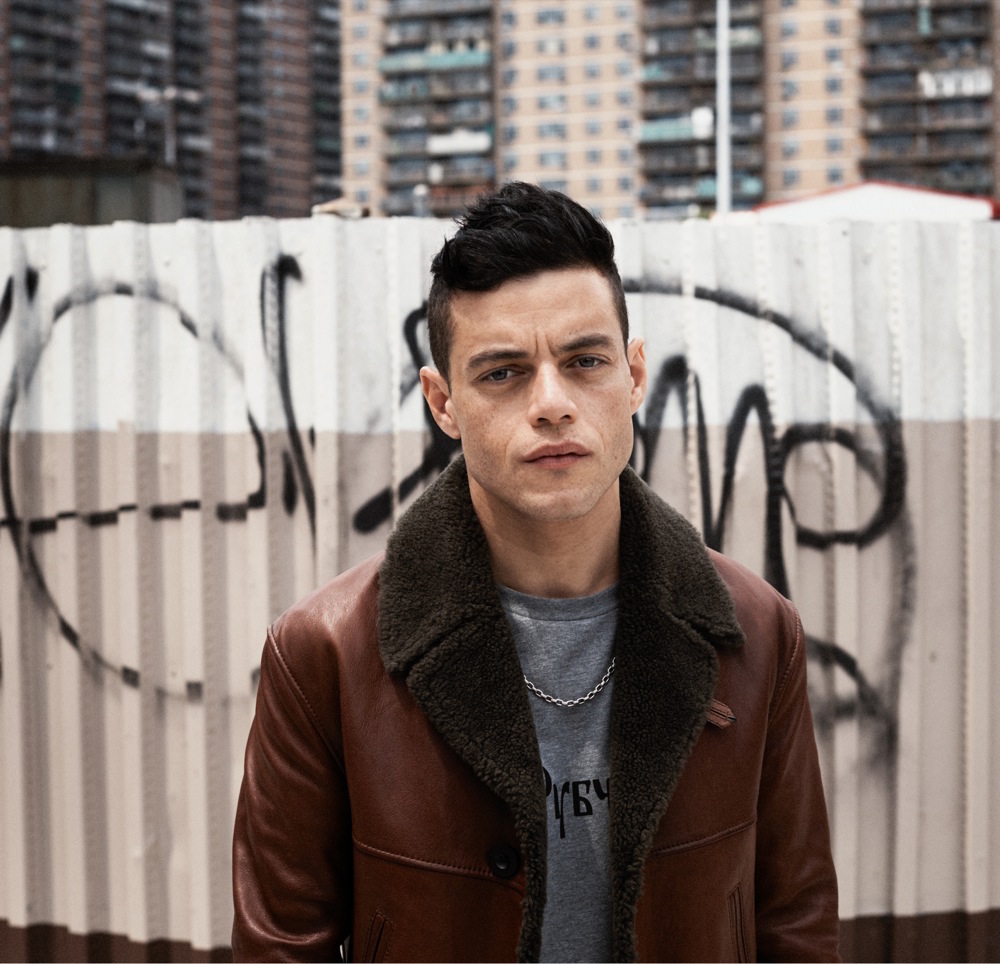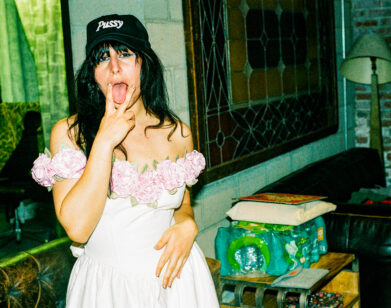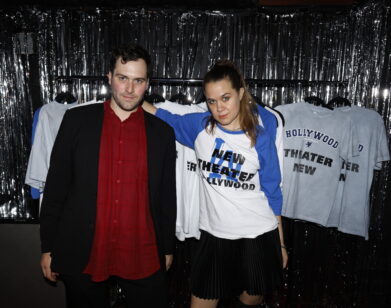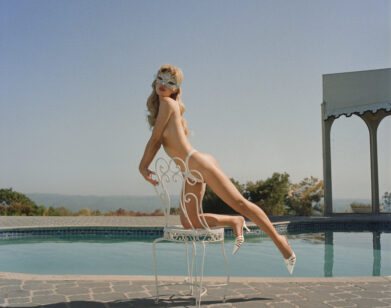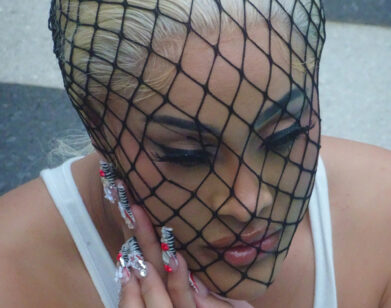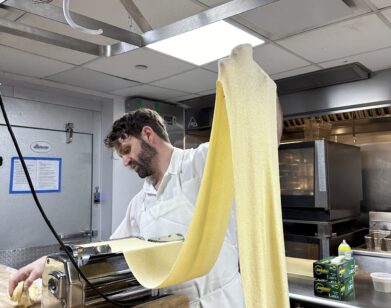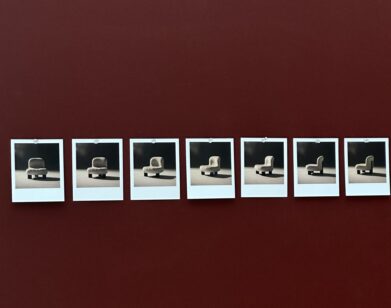Rami MALEK
AS MUCH AS I THOUGHT THAT I HAD THIS GUY DOWN AND UNDERSTOOD HIM AND WAS LIVING IN HIS SKIN, I REALIZED THERE WAS SO MUCH MORE OF HIM THAT I HAD YET TO DISCOVER. RAMI MALEK
If the recent golden age of prestige television has foisted the antihero upon us, the Golden Globe-winning, visually stylish Mr. Robot, which premiered last summer to much acclaim on USA and is now back for its second season, delivers an unreliable, morphine-addicted, paranoid protagonist destined to join the canon of TV’s most memorable rebels. But this time, he lives by Occupy ideals, dresses in a black hoodie, and is set on smashing the corporate power structure. Elliot Alderson, a cyber-security engineer by day, vigilante hacker by night, and leader of the Anonymous-like collective fsociety, is the eyes, ears, and sentience of the series. Played by Los Angeles native Rami Malek with a nuanced intensity, it’s the kind of role most up-and-comers would kill for—gritty, multi-layered, and a career definer.
Malek, 35, has been acting professionally for over a decade. He established himself as an edgy character actor in acclaimed indies like Short Term 12 (2013) and Ain’t Them Bodies Saints (2013), and has worked with the heavy-hitting directors Paul Thomas Anderson (The Master, 2012) and Spike Lee (Oldboy, 2013; Da Sweet Blood of Jesus, 2015), but as he tells his friend and Mr. Robot superfan Robert Downey Jr., playing Alderson has opened up a whole new world of possibilities, including his first leading film role, in Sarah Adina Smith’s mystery Buster’s Mal Heart, which he recently completed filming. Downey Jr. caught up with Malek by phone in early June, a few weeks after he visited the Mr. Robot set in New York.
ROBERT DOWNEY JR.: Mr. Malek, how are you feeling? What’s going on right now?
RAMI MALEK: Right now, I am home doing a bit of press. We have one of those hiatus weeks because, as you know [Mr. Robot creator], Sam [Esmail] is directing everything. He gets a week of prep before we complete season two of Mr. Robot.
DOWNEY JR.: Do you draw any comparisons between a director/creative partner and a brother, both essentially named Sami?
MALEK: Yeah. I actually do. They both have, in the time we’ve spent together, pretty much told me exactly what to do with my life. [laughs] There are some striking similarities between the two of them: They’re both Egyptian, they both vaguely resemble each other.
DOWNEY JR.: It’s funny how that works. Now I’m not going to start asking you about relationships, in case you were wondering. I’m in this odd position of realizing that it’s somewhat a daunting task to appropriately interview somebody. What the heck is Buster’s Mal Heart?
MALEK: I read this very experimental script on the first season we were shooting [Mr. Robot]. It was really poetic and cool, and it left so much to the imagination. So much of it was just scene descriptions, and we would improv the meat of the dialogue. That was something I looked at and was like, “Well, I’ll probably never get a chance to do something like this again.” I think it’s done now. Sarah Adina Smith directed it and is editing it, and is probably submitting it to festivals right now.
DOWNEY JR.: Oh, I wanna see it!
MALEK: Maybe we’ll screen it together. It won’t be as elaborate as your Star Wars screening, but … Am I supposed to talk about that? Or maybe not?
DOWNEY JR.: [laughs] Listen, it’s a two-way street, pal. First of all, are you in town next Wednesday?
MALEK: I’m not. What kind of fun adventure do you have planned out?
DOWNEY JR.: I had some ideas, but whatever. I guess if I want to see you for the foreseeable future, I just have to come to set again.
MALEK: [laughs] That was amazing. You turned me into a hero when you came to set. I’m not kidding. They were like, “You know him?” “How do you know him?” I knew it was very cool to know you, but the world started paying me more attention on that day on set. Maybe I elaborated on our relationship too much and started fantasizing it was more than it actually was. No, I just told them how close we were and that we hang out, we celebrate holidays together, we watch movies together, all of which is true!
DOWNEY JR.: [laughs] I mean, it was great to see you, very nice to catch up with [Christian] Slater. And, without giving anything away, I was just happy that I was able to see a scene with you and Slater that left everything to the imagination.
MALEK: Usually I look behind the monitor and it’s Sam and Joe Schmo behind there. “Okay, film icon Robert Downey Jr., one of the greatest actors to have graced this planet, is watching the monitor as I deliver a slew of experimental takes before I get to one that might have possibly worked.”
DOWNEY JR.: Now, let me tell you something, that first take was the take. It’s probably not the one that’s going to be in the episode, but it was perfect in that you were going to try what you were going to try, you were going to commit to it fully, and then you were going to not be ashamed if you were directed away from it. I thought it was brave, and vital, and awesome. Without getting into details, you made some sounds that I have never heard made on the set of filmed entertainment before. And they were appropriate to the situation.
MALEK: [laughs] I felt that was the case. You know what’s funny, I remember you said, “What was wrong with the first take?” And I was like, “Yeah, Sam, what was wrong with the first take?” We were doing a scene about three weeks later, and Sam comes up to me, and I don’t know if it was the light—we were losing light that day—but he gave me a couple takes, and that was it, and we moved on. I wanted one more desperately. He goes, “I was talking to Downey when he was on set …” He asked you, I think, how many takes usually work for you, and you said something like, “The first one’s pretty good. The second one’s about perfecting it.” So he looks at me and he goes, “Well, you know, Downey only needs two takes.”
DOWNEY JR.: [laughs] Usually they’re just warming up technically, too, and usually they’re letting things happen that shouldn’t be happening on the first take because no one really takes the first take all that seriously. But I bet that a movie comprised entirely of cleaned-up first takes would be extraordinary.
MALEK: That is not a bad idea. That’s the film we do together!
I DON’T WANT PEOPLE TO LOOK BACK AND THINK, ‘THIS CHARACTER WAS ENTIRELY IN HIS WHEELHOUSE AND HE’S PROBABLY GOING TO END UP PLAYING A BUNCH OF PARANOID GUYS WHO HAVE CONSPIRACY THEORIES.’RAMI MALEK
DOWNEY JR.: That’s what Buster’s Mal Heart is leading up to. This is beyond experimental. Are you going to hang out with your family while you’re in town? How is everybody?
MALEK: I saw everybody yesterday. They all stopped by the house. I was actually just working on some scenes for the show and reading a script and trying to get work done, and I realized quickly that was not going to happen because my sister is getting married, and she wanted help with finding some of my dad’s clothes to weave into her wedding dress. That was cool. We ended up getting nostalgic and reminiscing about the good old days. It was a fun little bonding experience, so that supersedes all work at some point.
DOWNEY JR.: I automatically thought from the second I started watching Mr. Robot, “Oh, this guy is clearly a local hire.” It wasn’t the fact that you didn’t bother to pretend that you have to have a New York accent to be a New Yorker, because everything is so melting pot nowadays. I’m just saying, because the character is so identified with that kind of netherworld, East Coast, New Yorky vibe, do you feel a sense of being home when you’re there? Or is it more contingent on the fact that that’s Alderson’s rough place of existence?
MALEK: I’ve always felt like I belong there. Growing up [in L.A.] and having a family here was something that I, of course, adored because I was surrounded with that unit. But from the first time I went over there, I felt connected to the way things move, the pace, the ability to strike up a conversation with anybody. I know that people often say it’s hard to talk to people in New York. I think it’s harder sometimes in L.A. But I like the neighborhood vibe, I like getting on the train and going anywhere with that type of speed, having everything at my disposal. The culture, the pace, all of it. I like feeling like I’m in that concrete jungle. I know it’s not your favorite, but—
DOWNEY JR.: Well, you know, I’m from there, so I have a love/hate thing. Ask any New Yorker. Now, is it all right to ask a very general question about season two?
MALEK: Ask away.
DOWNEY JR.: This is probably the least interesting thing I could ask, but I’m trying to be vague. I feel like I’m doing like a Marvel interview right now, and I’m the person who’s not going to get any answers that I want.
MALEK: You would be the one person to get the most amount of answers, so I feel like you could get away with murder here.
DOWNEY JR.: [laughs] You know what, I’m a worker amongst workers today, and it suits me well. How strung out is Elliot when we find him this season?
MALEK: I’m going to say he’s very, very focused, if I may.
DOWNEY JR.: Great. And, as a guy who’s never been arrested or been brought up on any weapon or drug charges, how was it doing that whole first season playing someone who is an unreliable, strung-out-ish narrator? He was super-focused within that world, so this is a new kind of focused you’re talking about.
MALEK: Canadian customs might argue my personal history on that matter, but he was extremely focused last year. He had an agenda, and obviously he was using it as a way to facilitate numbing himself or furthering his agenda, making it a little bit easier to plot out, somehow. This year, he’s coming to terms with this reality of having this kind of dual existence, knowing that Mr. Robot’s existence is real. That creates an entirely different focus for him. I think he’s in a really guilty place when you first see him. As much as I thought that I had this guy down and understood him and was living in his skin, I realized there was so much of him that I had yet to discover.
DOWNEY JR.: That’s awesome. That that can be a really transformative thing when you realize everything that happened in this last run, it carries you a little bit, but you’re always starting at square one. I saw you on the show. I tracked you down. We became friendly. Then I saw that you didn’t get soft or fat, but you looked different. You looked like a guy who wasn’t working. Then I saw you in New York, and it was like you dropped all this weight; now I’m sure it wasn’t that much. But everyone thinks, “Oh, he’s just stressed out.” But that was a very specific choice of yours to get back to the exact fighting weight you were at. What was that challenge and what was that process for you?
MALEK: That’s a good question. If I gain, like, five or ten pounds, it makes a difference. For this, I remember Sam telling me early on, “You’re gonna be on morphine, you’ll be doing a lot of drugs, you’re gonna be very focused. I don’t see you eating much throughout playing this character.” I think the only time I ate during the first season was on the pilot, I ate some McDonald’s french fries. I hadn’t been eating much getting ready for that and going through the ringer of my own personal training. I was devouring fries during that scene like nobody’s business. They might have had to tell me to slow down at one point. I get on this regimen. I worked with Paul Thomas Anderson once, and he said, “It’ll do something to your face.” For a guy like that, if you can see that he’s going through something and everything’s a bit more sunken, it’s less work you have to do as an actor when the camera’s actually rolling. How about you? You’ve done it many times in your career. Look at how fucking built you were in Sherlock.
DOWNEY JR.: A lot of that was luck. You’ll find that every ten years, it gets harder. So I want to do the follow-up 2036 interview with you, and we’ll see what kind of game we’re talking about then. So then, as far as eyes down the road, the real thing that a lot of us are going to be paying attention to is the choices you make and the challenges you bring on yourself. I know it’s impossible to plan for that, because you kind of know what you’re going to do when you’re going to do it. But if you had to shape roughly what sort of transition from this series into the next phase of your career might look like … Is that even a fair question to bring up at this point?
MALEK: It is, because it’s something that I think about daily. I don’t want people to look back and think, “This character was entirely in his wheelhouse, and he’s probably going to end up playing a bunch of paranoid guys who have conspiracy theories.” Which could easily happen! I’ve had my fair share of 1970s conspiracy movies delivered over. I would love to turn around and do something polar opposite, and that might actually be happening soon. If the right people are involved and the script is just as powerful, I’d like to make some even crazier choices.
ROBERT DOWNEY JR. IS A TWO-TIME ACADEMY AWARD NOMINEE FOR HIS ROLES IN TROPIC THUNDER AND CHAPLIN. HE HAS STARRED IN THE ROLE OF MARVEL’S TONY STARK/IRON MAN SINCE 2008.

